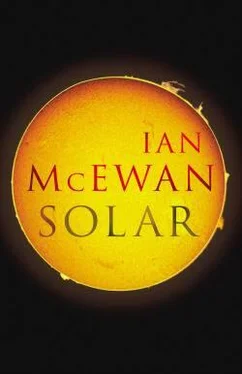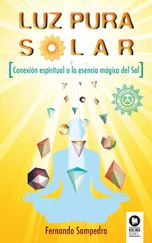Saleel was saying, 'A conservative lot, institutional investors, not scientific, of course, so not too technical would be most heartily appreciated.'
By turning his shoulder into the room, Beard was able to prompt his host, clearly a sensitive and intelligent man, to exclaim as he handed over a white envelope, 'But of course, you need refreshment! And please, your emolument.'
A minute later Beard had the plate and, on it, thick-cut smoked wild salmon speckled with dill and ground black pepper between thin white bread slices, nine heavy quarter segments – a precautionary number, since he did not have to eat them all. But he did, and very quickly, without much satisfaction or even a thought for the river, because a soft-spoken man with a stutter wanted to tell him about his son's physics exam, and then a tall man with a stoop and a jutting ginger beard and large accusing eyes set eerily far apart introduced himself. He was Jeremy Mellon, lecturer in urban studies and folklore. Beard, who was on his sixth piece, felt obliged to ask why Mellon was here.
'Well, I'm interested in the forms of narrative that climate science has generated. It's an epic story, of course, with a million authors.'
Beard was suspicious. This was the Nancy Temple tendency. People who kept on about narrative tended to have a squiffy view of reality, believing all versions of it to be of equal value. But he did not even have to say, 'How interesting,' for people were setting down their cups and saucers and hurrying to find their seats, and the old fellow with a stick was grimacing at him and once more tapping his watch, and there was only just enough time to bolt down the last three wedges of smoked salmon.
Beard was guided to a purpose-built stage and shown to a moulded orange plastic seat behind a vat of bilious red and yellow tulips. He tried not to look at them. He thought there was a general air of unreality about the gathering. A couple of hundred people sat in ranks, in a shallow arc before him. The pinkness of so many faces looked absurd. Their chatter seemed to resound in an echo chamber. The Savoy was swaying, or undulating gently beneath his feet, as though it had slid into the river and was rocking on the turning tide. He succumbed to a fit of yawning, which he suppressed through tensed nostril wings. He had to face it, he was a little queasy, and it did not help that a heavy-breathing technician with mottled skin and odorous tooth decay or pyorrhoea bent close over his face to attach a radio mic.
While Beard sat cross-kneed, with customary, frozen half-smile, pretending to listen to Saleel's long and toofulsome introduction, and even more so when at last he stood to bored applause and took his place behind the lectern, gripping tight its edges in both hands, he felt an oily nausea at something monstrous and rotten from the sea, stranded on the tidal mud flats of a stagnant estuary, decaying gaseously in his gut and welling up, contaminating his breath, his words and, suddenly, his thoughts.
'The planet,' he said, surprising himself, 'is sick.'
There was a groan, followed by a susurrus of dismissal from his audience. Pension-fund managers preferred more nuanced terms. But using the word 'sick', rather like vomiting itself, gave Beard some instant relief.
'Curing the patient is a matter of urgency and is going to be expensive – perhaps as much as two per cent of global GDP, and far more if we delay the treatment. I am convinced, and I have come here to tell you, that anyone who wishes to help with the therapy, to be a part of the process and invest in it, is going to make very large sums of money, staggering sums. What's at issue is the creation of another industrial revolution. Here is your opportunity. Coal and then oil have made our civilisation, they have been superb resources, lifting hundreds of millions of us out of the mental prison of rural subsistence. Liberation from the daily grind coupled with our innate curiosity has produced in a mere two hundred years an exponential growth of our knowledge base. The process began in Europe and the United States, has spread in our lifetime to parts of Asia, and now to India and China and South America, with Africa yet to come. All our other problems and conflicts conceal this obvious fact: we barely understand how successful we have been.
'So of course, we should salute our own inventiveness. We are very clever monkeys. But the engine of our industrial revolution has been cheap, accessible energy. We would have got nowhere without it. Look how fantastic it is. A kilogram of gasoline contains roughly thirteen thousand watt hours of energy. Hard to beat. But we want to replace it. So what's next? The best electrical batteries we have store about three hundred watt hours of energy per kilogram. And that's the scale of our problem, thirteen thousand against three hundred. No contest! But unfortunately, we don't have the luxury of choice. We have to replace that gasoline quickly for three compelling reasons. First, and simplest, the oil must run out. No one knows exactly when, but there's a consensus that we'll be at peak production at some point in the next five to fifteen years. After that, production will decline, while the demand for energy will go on rising as the world's population expands and people strive for a better standard of living. Second, many oil-producing areas are politically unstable and we can no longer risk our levels of dependence. Third, and most crucially, burning fossil fuels, putting carbon dioxide and other gases into the atmosphere, is steadily warming the planet, the consequences of which we are only beginning to understand. But the basic science is in. We either slow down, and then stop, or face an economic and human catastrophe on a grand scale within our grandchildren's lifetime.
'And this brings us to the central question, the burning question. How do we slow down and stop while sustaining our civilisation and continuing to bring millions out of poverty? Not by being virtuous, not by going to the bottle bank and turning down the thermostat and buying a smaller car. That merely delays the catastrophe by a year or two. Any delay is useful, but it's not the solution. This matter has to move beyond virtue. Virtue is too passive, too narrow. Virtue can motivate individuals, but for groups, societies, a whole civilisation, it's a weak force. Nations are never virtuous, though they might sometimes think they are. For humanity en masse, greed trumps virtue. So we have to welcome into our solutions the ordinary compulsions of self-interest, and also celebrate novelty, the thrill of invention, the pleasures of ingenuity and co-operation, the satisfaction of profit. Oil and coal are energy carriers, and so, in abstract form, is money. And the answer to that burning question is of course exactly where that money, your money, has to flow – affordable clean energy.
'Imagine if I were standing in front of you two hundred and fifty years ago – you, a collection of country gentlemen and ladies – predicting the coming of the first industrial revolution, and telling you to invest in coal and iron, steam engines, cotton mills and, later, railways. Or a century or so later, with the invention of the internal combustion engine, I foresaw the growing importance of oil and urged you to invest in that. Or a hundred years on, in microprocessors, in personal computers and the internet and the opportunities they offered. So here, ladies and gentlemen, is another such moment. Do not be tempted by the illusion that the world economy and its stock exchanges can exist apart from the world's natural environment. Our planet earth is a finite entity. You have the data in front of you, you have the choice – the human project must be safely and cleanly fuelled, or it fails, it sinks. You, the market, either rise to this, and get rich along the way, or you sink with all the rest. We are on this rock together, you have nowhere else to go…'
Читать дальше












